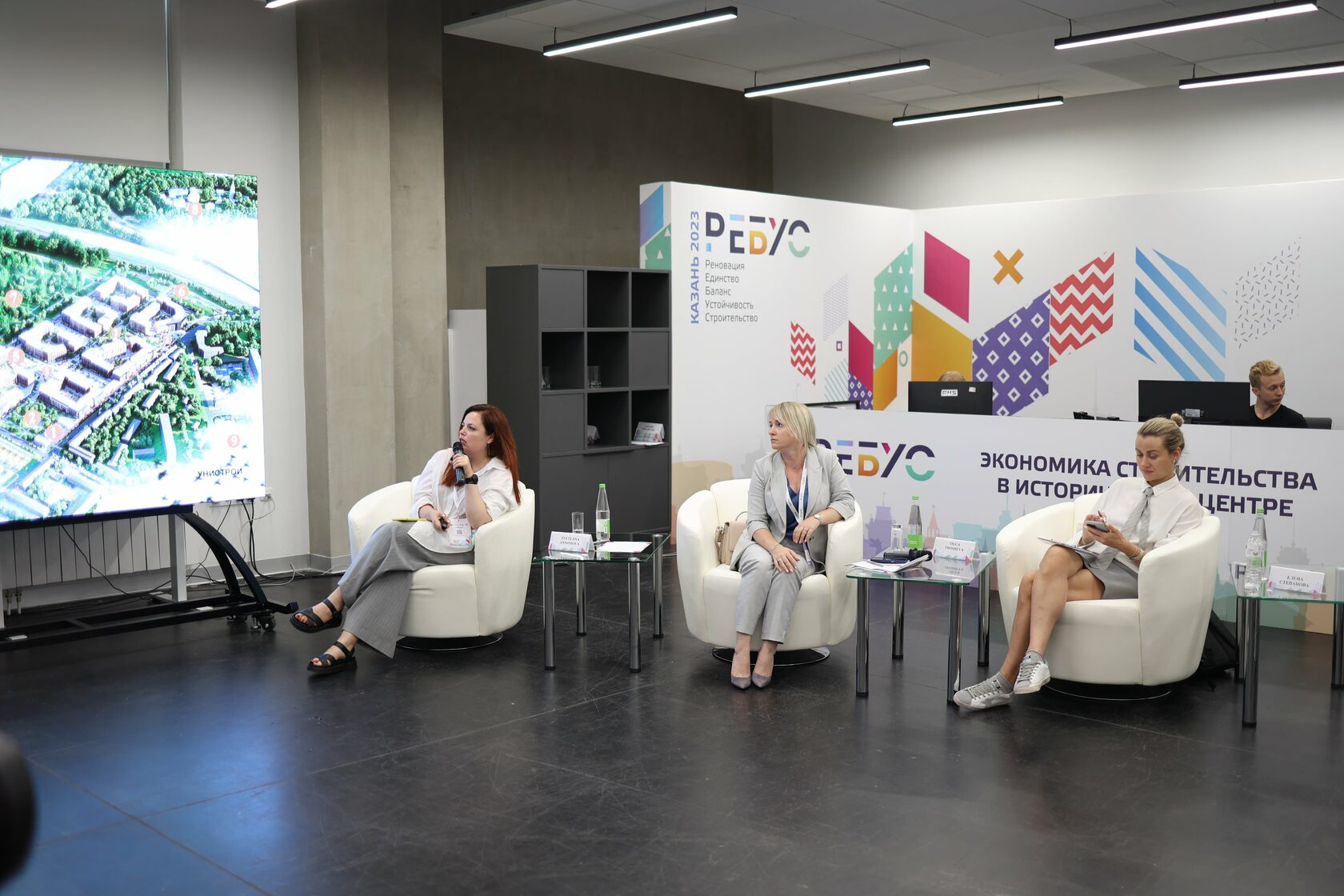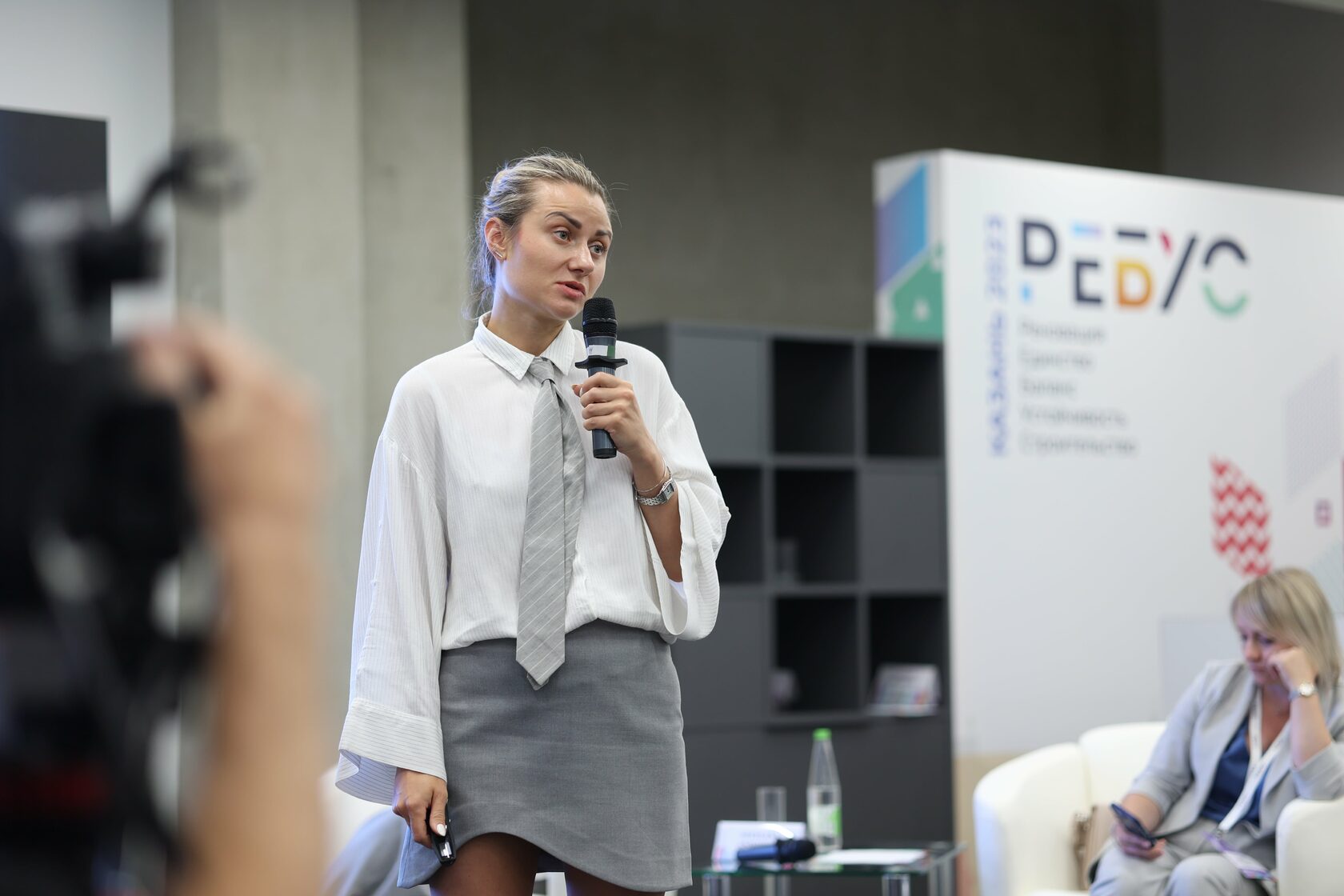Special session of the Russian Guild of Managers and Developers “Integrated development projects in the historical center”
- Elena BodrovaVice President, Executive Director of the Russian Guild of Managers and Developers, NPModerator
- Olga TroshevaHead of the Peterburgskaya Nedvizhimost (Petersburg Property) consulting center
- Aleksey MatskevichHead of the GrowUp federal network of co-working spaces
- Viktoria TrubitsynaDesign director of AFA Group
- Игорь ТемнышевПартнер Nikoliers
- Svetlana Anisimovahief Architect-Urban planner, representative of the architectural and design bureau AIU
On July 3 Kazan hosted a special session of the Russian Guild of Managers and Developers, NP “Integrated development projects in the historical center” at the site of the IT-Park named after Bashir Rameev, within the framework of the international Forum “REBUS: Economics of construction in the historical center”. The speakers at the session presented current projects, discussed the cooperation between the authorities, investors and citizens, as well as the balance of functions, which is the most important element of the financial sustainability of projects in city centers. Elena Bodrova, Vice President, Executive Director of the Russian Guild of Managers and Developers, NP, moderated the session.
The speaker told about working with investors in the historical part of the city. At the moment, 37 cultural heritage sites are being reconstructed in Vologda, 20 have already been restored, and 7 of them are part of the Vologda wooden architecture. She stressed that, it is necessary once again to draw the attention of the authorities to the need for hard work on mistakes in this process, because systemic errors occur every year during the implementation of the projects and development of significant budget funds, which lead to inefficient investment of budget money. Among the leaders in the development of micro-districts are the activities for improvement of sports and playgrounds, green areas and the improvement of pathways to social facilities.
The speaker also noted that the main task at the moment is to create comfortable conditions for investors. Significant funds are being spent on improvement projects, and such investments should be effective. In practice, thoughtless work on projects leads to the fact that residents, instead of enjoying new parks, sports grounds and squares, consider that the money is simply “buried in the ground”.
As the speaker noted, there are more stringent regulations and the area of free plots is limited in the historical center. That is why, it is necessary to find new solutions for locating social infrastructure facilities. When considering the acquisition of territories for development, the developer may be faced with the need to negotiate with many owners of land. To implement the project, it may be necessary to make changes to the master plan of the city. Such factors as engineering preparation of territories, coordination of the project, architectural appearance, as well as infrastructure construction must be taken into account when implementing redevelopment projects in St. Petersburg. Over the past 3 years, about 50 cultural heritage objects have been sold to investors.
Most of them (42%) will house offices, hotels (27%), and apartments (21%) after reconstruction; and only 6% will be given over to trade. For 5 years, about 9 objects of cultural heritage have been sold at auction under the special program of the city “Ruble per meter”: after restoration, the rental rate should be 1 ruble per 1 square meter per year.
- When working on historical territories, it is important to take into account such factors as: historical and cultural heritage, historical relief, street network, existing pedestrian links, and the architecture of the surrounding buildings. One must explore maps of the area and what objects were here in previous centuries. What can be used to build a dialogue between existing, past and future buildings and architecture. The history of a place can also be reflected in various images of public spaces.
At the same time, it is necessary to take into account modern trends in architecture and landscaping, as well as the client's request. For example, today it is important for a client to create a development scheme with safe pedestrian spaces. At the same time, it is imperative to correctly distribute functional zoning so that there is no intersection of pedestrian paths and parking lots. In modern complexes, it is necessary to provide the project with the entire necessary infrastructure: boulevards, social and educational facilities, parking lots, as well as the possibility of placing premises for supermarkets, pharmacies, fitness clubs, cafes, offices, and more.
The speaker shared the difficulties encountered in the design of buildings on the example of the residential complex “Statum” in Kazan; the restrictions which occurred on the territory and implementation of all requests coming both from the city and the developer.
As the speaker noted, the developer is engaged in the project for 10-15 years. He still has construction, environmental, financial risks. Operational risks are very rarely discussed today, but they do exist; this is not only a matter of building networks, but also their further operation and management.
Elena Stepanova demonstrated a modern park, on the site which previously was a location of an unsafe environment. Opening of Blucher Square pleased the children most of all, it is for them that most of the sites and structures located there were intended. There was a high-rope adventure park, and a climbing wall, and a huge slide, and even a miniature Cupid. A small artificial river flows through the entire area, and the children can regulate the amount of water in it with the help of special mechanisms, the principle of which is similar to a dam. Thus, children will be able to gain useful knowledge in physics in a play form.
After reconstruction, the space is suitable for both everyday recreation and festive events. The company preserved the trees, arranged additional lawn, planted new bushes and installed a fog fountain, as well as a children's area, hammocks, tennis tables and playgrounds. The result was a modern public territory, built on the basis of the principles of interaction between people, communications, as well as the norms and philosophy of urban planning existing today.
In terms of PIK business lines, it is not only the housing segment, at the moment the company is planning activity in the regions with 3 blocks: development, production block and fund maintenance and management services.
GrowUp is a federal network of co-working spaces with a unique community of professionals: its own ecosystem of entrepreneurs, freelancers, startup teams, told the representative. At the moment, the GrowUp network has co-working spaces in two cities: St. Petersburg and Moscow.
- A person buys not only an apartment, but also a life beyond its limits, - Victoria Trubitsyna noted. She also said that at present it is necessary to emphasize everything that creates aesthetics and the “Wow” effect.
Co-working spaces are gaining even greater popularity every day. They have become the need of a new generation. It is important for people that they are within walking distance from home.















